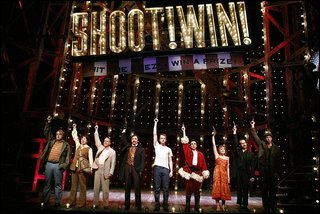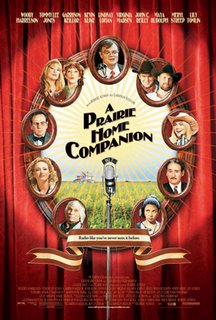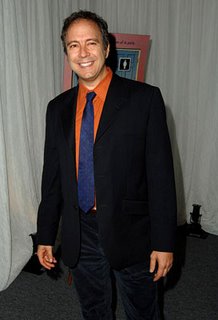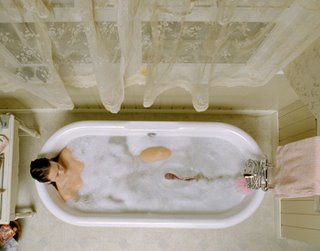

Arts writer Stephen Blair invites you into his dreamy lair of films, books and music.





STINKY BOOTS
Kinky Boots
Grade: C
The new British comedy Kinky Boots desperately wants to take you for a walk on the wild side. But these boots are not made for walking. Well, not to anyplace interesting, anyway.
Granted there’s some fun cross-dressing action in a queer cabaret and on a fashion runway, and Chiwetel Ejiofor (Dirty Pretty Things) delivers a playful and soulful performance as a drag queen named Lola. But these good bits are squandered by a script that lacks the wit and insight that made drag queen classics like Torch Song Trilogy and Some Like It Hot so memorable.
In the tradition of The Fully Monty and Calendar Girls, this is a story about quaint British folk who go out on a naughty limb to make money. Like Calendar Girls, it’s based on real events.
Charlie Price is a emotionally reserved young man who plans to move to London with his fiancée. His father dies, however, leaving him in charge of a struggling shoe factory in a drab industrial town. The dismal situation starts looking up when Charlie meets a sassy drag queen (Ejiofor) who inspires him to manufacture outrageous stiletto-heeled boots that are strong enough to support big and brawny male transvestites. This just may be the niche market that will save the factory.
Much of the predictable plot centers on the conflict between Lola and Charlie, who’s embarrassed to be seen in public with a drag queen. Charlie is a well-mannered and generally kind bloke, but like some of his piggish male employees he believes that one can’t possibly be a real man and dress in a frock at the same time.
A series of interminable and awkwardly staged scenes proves – surprise, surprise- that Lola has more masculinity in her heavily glossed lips than Charlie has in his whole uptight body.
Movies about transvestite footwear don’t strut our way everyday. It’s a shame that director Julian Jarrold and company couldn’t find a way to convert this bizarre and endearing premise into a rollicking good time.

NOTES ON OATES
You'd think that a bunch of tenth grade honors English students would be diehard readers, sprinting home every afternoon to kick back with a frosty Yoo-Hoo and some Kerouac. But this was not the case with Mrs. Martha Johnson's charges at Rockville High during the 1989 to 1990 school year.
Of course Brian Walsh, Kris Dhandaphani, Karen Potter and the rest of these honor roll slaves read A Tale of Two Cities, Julius Caesar, Hirsoshima and everything else that Mrs. Johnson assigned. But you got the feeling that most of them would rather French kiss a rattlesnake than read a book of their own volition.
For me extracurricular reading dated back to elementary school, when I read Beverly Cleary and Judy Blume tomes when my teachers weren't looking. By my sophomore year in high school my trusty paperback companions included Daphne Du Maurier's Rebecca and Emily Bronte's Wuthering Heights. My classmates teased me about my bookishness, and Mrs. Johnson at once vindicated and humiliated me one day by telling them to shut their illiterate pieholes.
Sometimes she asked me to stay after class, and recommended books and authors she thought I might like. I have fond memories of our conversations in that dimly lit classroom, but I sometimes regret the day she planted Joyce Carol Oates in my consciousness.
Without explaining exactly why, Mrs. Johnson said Oates was right up my alley. I started off by reading her then-current novel Because it is Bitter, and Because it is My Heart. I felt fascinated and repelled by her violent and feverish prose, and couldn't wait to get my hands on more of her stuff. At the mall bookstore I gawked at her massive oeuvre, buying as many titles as my paycheck from Fabian Drugs allowed. Within a couple of years I burned through You Must Remember This, American Appetites and Black Water, but her sprawling American Gothic novels like Bellefleur left me cold.
Let it be known that I have my share of obsessive tendencies, and I'm not ashamed to admit it. Whether we're talking Joni Mitchell CDs or bubble tea, when I like something I have to have as much of that thing as possible. Even at the height of my enthrallment I knew that Joyce Carol Oates was a potentially dangerous addiction because her grotesque subject matter disturbed me for days on end. Of course my compulsions overruled my common sense and I continued to read her neverending output at a breakneck pace. One of my favorites was her 1993 novel Foxfire: Confessions of a Girl Gang.
Then the Golden Age of Oates melted. Starting with 1996's overrated We Were the Mulvaneys and continuing through the late 1990s, her books became so dark and gratuitously violent that I couldn't bare to finish them. Like my friend Rachel said, reading Oates can feel like someone's probing a part of you that's already dead. I mean, who the hell would curl up with her recent book Rape: A Love Story?
Needless to say I put my obsession to rest and moved on to brighter pastures. But I still think of her fondly sometimes because when she's good she's SO good.
On Saturday, April 22 Oates appeared at a Portland literary festival called Wordstock. At first I thought I'd skip it because - like I said- I feel like my passport to Oates Country has expired. But in the end I couldn't resist the opportunity to see this bizarre force of nature read to a crowd of about 300 at the convention center. She took to the stage in feisty fashion, complaining about the lack of intimacy in the huge room and some crappy jazz music that made it hard for her to concentrate.
Watching her I remembered why I used to be so taken with her. First she spoke eloquently about her writing process. Then, true to form, she read the beautifully constructed but incredibly disturbing story "Heat," which details the murder of two young girls.
After hearing this woeful tale it felt downright criminal to walk outside into a sunny day topped by a perfectly blue sky.


THE HUNG & THE RESTLESS
If you're crazy or perpetually high on paint fumes, the upcoming Spanish film 20 Centimeters will make perfect sense to you. The rest of you are on your own.
Cinematically speaking, this is the dawning of the age of transsexuals.
Transamerica garnered rave reviews for its insightful depiction of a male-to-female transsexual.
Now the sassy Spanish film 20 Centimeters offers a decidedly crazier spin on this formerly taboo theme. Like the films of bad boy auteur Pedro Almodóvar, it’s subversive, raunchy and visually dazzling. In terms of quality it has nothing on, say, All About My Mother. But writer and director Ramón Salazar one-ups Almodóvar’s antics by adding catchy and bizarre musical vignettes.
Three women sing Madonna's “True Blue” while scantily clad hunks simulate oral sex with barbecue foods. A lady vampire gets struck by lightening as she levitates. People sing and dance in the operating room before a sexual reassignment surgery.
Marieta, the main character, has a couple of big problems on her hands. For starters, she packs a 20 centimeter (that’s over 8 inches) penis that she wants to get rid of, but she can’t afford the surgery. She also has narcolepsy, causing her to fall asleep at inopportune times and drift into musical reveries.
As she serves out her sentence in gender limbo, she has the good fortune to fall for a gorgeous guy who happens to love sucking cock and taking it up the ass. But therein lies the rub: Marieta wants to be loved for her vagina-to-be, not the prodigious peter she doesn’t even want.
Marieta is not a particularly likable character, and the picture falls flat at times because it becomes increasingly difficult to give a damn about her fate. It’s unclear what – other than sex and MTV – goes on in her mind. Perhaps this is Salazar’s intention, but it makes for pretty unrewarding viewing in the long run.
Interestingly, the heart of the movie beats in the supporting characters, the misfits and malcontents who surround Marieta. Almodóvar veteran Rossy de Palma brings a welcome sense of melancholy to the film when she discusses the downside of transsexuality, and there’s a heartbreaking dwarf character who can’t play the cello because he’s not big enough.
In 20 Centimeters, there’s just no escaping the cliché that size really does matter.

READ THIS!
I took a few minutes today to devise a reading list. If history repeats itself - and I'm sure it will - I'll barrel through a few of these buggers and leave the rest to clog up my bookshelf like long hair in a bathtub drain. Here are the contenders:
MARCH, GERALDINE BROOKS
This very recent winner of the Pulitzer Prize for Fiction speculates what happens to Mr. March (the patriarch of the Louisa May Alcott's Little Women clan) during the Civil War.
THE AMALGAMATION POLKA, STEPHEN WRIGHT
Yet another Civil War yarn. Critics say it's stylistically reminiscent of Voltaire's Candide. If nothing else, it has a fabulous title.
THE CANTOR'S DAUGHTER, SCOTT NADELSON
This is a new collection of short stories by Portland author and all-around good guy Scott Nadelson. Scott's previous collection, Saving Stanley: The Brickman Stories, was an award winning knockout. The Cantor's Daughter won't be in bookstores till June, but you can fetch yourself a copy now at www.hawthornebooks.com.
ABOUT GRACE, ANTHONY DOERR
Doerr graduated a year ahead of me at Bowdoin, but I never met him. I love The Shell Collector, his debut book that contains the O. Henry Award-winning story "The Hunter's Wife." About Grace is his first novel, and it's rumored to be slow-moving but gorgeously written.
DORA: AN ANALYSIS OF A CASE OF HYSTERIA, SIGMUND FREUD
Judging by the recent cover story on Freud in Newsweek, there's some kind of psychoanalytic renaissance going on that I didn't know about. I've decided to hop aboard the train and read Dora, a study in aberrant female behavior that my friend Liza really dug when she read it for a college seminar called Unspeakable Sexualities.


C.R.A.Z.Y. 4 U
Recently the French-Canadian film C.R.A.Z.Y. swept the Genies, Canada's equivalent to the Academy Awards. I'm not sure when it's coming out in the States, but do see it if you get a chance. I reviewed it during the Portland International Film Festival in February:
C.R.A.Z.Y.
Grade: A-
At first glance C.R.A.Z.Y. is a fairly straightforward drama about a Quebec family, but writer and director Jean-Marc Vallée combines vivid fantasy sequences, dynamic camera work and flashy editing to elevate the material from a soap opera to a visceral cinematic experience.
The film opens with the birth of the main character, Zac, on Christmas Day in 1960. This establishes a Christ parallel that becomes more obvious (and heavy-handed) when it later turns out that Zac has the power to ease the pain of colicky babies and burn victims.
Zac appears to be a gifted child that any parent would die for, and his mother loves him unconditionally. But when he starts dressing up like a girl, his conventional father fears he has a sissy on his hands. His discomfort with Zac’s incipient fagginess creates a virtually insurmountable rift between father and son.
As a teenager, Zac’s sexual identity crisis sometimes gets overshadowed by his older brother’s losing battle with drug addiction. He eventually seeks asylum from his father in Jerusalem, but a family tragedy unexpectedly plants the seeds of reconciliation between Zac and Pops.
There’s nothing revolutionary about C.R.A.Z.Y. Thankfully, coming out stories are not a rarity. As for Christ figures, they’re as old as, well, Christ - even if this one happens to be a cute gay kid who grooves to "Space Oddity."
Still, there’s no denying that this is bravura filmmaking. And Vallée has an uncanny knack for making all of his characters compelling.
And the soundtrack is just plain awesome. Classics by David Bowie, The Rolling Stones and Jefferson Airplane provide an electrifying backdrop to scenes that span from the 1960s to the 1980s. Patsy Cline’s “Crazy” is the title track.

LITTLE HOUSE ON THE PRAIRIE HOME COMPANION
Today I had the good fortune to see an advanced screening of Robert Altman's A Prairie Home Companion, which opens in theaters in June.
I'm a huge Altman fan, particularly Nashville, Short Cuts and 3 Women. But I've never been very fond of the Prairie Home Companion guru Garrison Keillor. He's very talented, yes, and I admire his commitment to keeping old-fashioned storytelling alive. It's just that his monotone delivery practically puts me in a coma.
So I went into the movie with mixed expectations, and left with a mixed - but mostly positive - reaction. Without giving too much away, the film chronicles a group of musicians who perform their longstanding live variety show for the last time (a corporate bigwig from out of town has bought them out). Meryl Streep and Lily Tomlin are fantastic as a singing sister act, and there are fun performances from Kevin Kline, Woody Harrelson and Virginia Madsen. And to my surprise I actually liked the desert-dry witted Mr. Keillor, who plays the grand pooh-bah on the program.
There's not a lot of substance to sink your teeth into, and a supernatural subplot feels a bit incongruous to the main event. But the show's fun while it lasts. But if you don't like old-time and country music you might find yourself asking Calgon to take you away.





CAT SCRATCH FEVER
I don't have much to report today, so I'm letting my cutsey cats do the talking. From left to right we have Confetta, Rupert and Chicklet. After a week of finicky dining, they're finally chomping down the raw food diet that the vet recommended.
Oh, I did go see the high school film noir movie Brick. I hated it, but the upside is that a false fire alarm went off in the middle of the show and Drew and I scored 2 free tickets from the management.
It's time to cap off the day with episodes of Entourage and Six Feet Under.

STINKERVILLE
Here are some new DVD releases that leave a lot to be desired. Paint your kitchen walls! Trim your nose hairs! Write to someone on Death Row! Just don't waste your time with this crap.
Bee Season
Grade: C
How do you spell “tedium”? After seeing this mishandled adaptation of Myla Goldberg’s excellent novel, you’ll have to fight the urge to say “B-E-E S-E-A-S-O-N.” The film, which stars Richard Gere and Juliette Binoche, faithfully follows the book’s plotline about an 11-year-old spelling wiz and her seemingly perfect but highly dysfunctional family. But co-directors Scott McGehee and David Siegel (who fared far better with The Deep End) get the tone all wrong. Goldberg’s book is dark, but it has a comic edge. Here, the proceedings are humorless, and the wannabe weighty religious themes come across as mystical mumbo jumbo.
Ellie Parker
Grade: C
This uneven and overlong comedy about a struggling Hollywood actress looks like it was filmed in one day on a budget of $50. Naomi Watts does her damndest to keep the episodic plot chugging along, and at times her performance recalls her brilliant portrayal of an ambitious actress in Mulholland Dr. But the premise is so limited that the jokes dry up long before the final credits roll.
Fun with Dick and Jane
Grade: C+
Are we having fun yet? Not really. Jim Carrey and Téa Leoni replace George Segal and Jane Fonda in this uneven update of the 1977 comedy about an upwardly mobile couple that turns to crime when the hubby loses his posh job. The remake gets off to a strong start with a sharp satire of an Enron-like corporation that suddenly folds and leaves its employees with incredibly shrinking pension plans. But when it comes to the couple’s slapstick robbery sprees, there are multiple misfired jokes for every genuine chuckle.
Shopgirl
Grade: C
You won’t have to shop around much to find a better movie than this vapid adaptation of Steve Martin’s bestselling novella. Martin, who wrote and produced the film, stars as a fiftysomething, emotionally detached millionaire who wins a trophy girlfriend in the form of a young Saks retail babe (Claire Danes). Despite a heartfelt performance from our so-called heroine, the doomed romance is totally unconvincing. Instead of zippy dialogue and character development, we get lots of pointlessly pretty shots of perfume counters and L.A. skylines. A dippy, irrelevant subplot with Rushmore’s Jason Schwartzman doesn’t help matters.

TEEN TROUBLE
This was one of my favorite books of 2005. I'll be an uncle soon, and I can only hope that my sister won't ever drop a time bomb like Tiffany on my doorstep.
Breakfast with Tiffany by Edwin John Wintle
(Miramax Books, $24.95 Hardcover)
*Note to penny pinchers: The paperback edition will be available for $13.95 starting June 14th.
Leave it to a queen to name his memoir after an Audrey Hepburn movie. Though it would have cost him a wistful “Moon River” reference, Edwin John Wintle could just as easily have borrowed another famous title and called his book The Odd Couple.
Either way, this is a touching and hilarious book for all you parents out there, or for folks who are crazy enough to even think of dipping their toes into the choppy waters of child rearing.
Breakfast with Tiffany chronicles a year in the life of Wintle and his thirteen-year niece, called Tiffany in the book for privacy issues. Wintle, a former actor and lawyer, has settled into his 40s with a successful career negotiating book deals for an unnamed film company. No longer the oversexed party boy he used to be, he stashes away his porn collection and opens his Greenwich Village apartment to his niece for the 2002-2003 school year.
Tiffany, you see, is a bit of a wild child. Though she’s very intelligent and a talented singer, she has dead-end friends and she flunks most of her classes. Her mother, asks Wintle to be a strict-but-lovable role model for a year, in hopes that Tiff will excel in academics and the arts, and learn some civilized manners to boot.
Wintle, who used to get along swimmingly with his niece, must accept the sad fact that he can’t be Tiffany’s best friend and a conscientious guardian at the same time: “I knew that most of the time she saw me as her adversary. Gone was the uncle she’d once idolized, replaced now by this uptight, controlling man whose mission in life was to deprive her of everything that makes her happy.”
Disappointingly, Breakfast with Tiffany is windy and sappy in the last 50 pages or so. And for perplexing reasons, Wintle does not disclose significant details about his personal life until the final chapters.
But overall this is a very satisfying memoir that invites comparisons to the addictive escapades of David Sedaris and Augusten Burroughs.

ALTERED STATES
Due to some good old tightening of the purse strings I haven't bought much new music lately. But a friend of mine at my Gladstone Coffee Shop hangout convinced me to give Sufjan Stevens a listen ( his first name is pronounced Soof-yan).
In case you haven't heard of him, Stevens is a 30-year-old Detroit native who has embarked on a rather massive musical undertaking. His goal? To live in each of the 50 U.S. states for a spell and then make an album about each state. First he tackled his home turf on a CD called Greetings from Michigan, playing (and this is just the tip of the orchestra) oboe, banjo, acoustic & electric guitars, glockenspiel and sleigh bells.
Greetings from Michigan is a decent album, but it's nothing compared to the wonderful 2005 follow-up, Illinoise. With his soft, dreamy vocals and his often ethereal arrangements, Stevens serves up 22 tracks based on Illinois themes. He doesn't win a lot of points for succinct song titles, though. My favorite track goes by the long-winded moniker "Come On! Feel the Illinoise! Part I: The World's Columbian Exposition/Part II: Carl Sandburg Visits Me In a Dream."
Watch out for the song about clown-faced serial killer John Wayne Gacy, Jr. It will freeze your blood if you listen closely enough.
Rumor has it that Oregon is the next entry in Sufjan's travelogue. Hopefully he can squeeze in an ode to Tanya Harding. He could call it, "Meditations on an Ice Ballerina Marred by Allegations of Unsportsmanlike Conduct Part I."




STEPHEN ON STEPHEN
Prior to the release of his latest film, Mrs. Henderson Presents, I interviewed maverick British director Stephen Frears at the Governor Hotel in Portland. He looked as haggard as hell and he couldn't wait to get to the airport to fly home for the holidays. Still, he graciously answered all my queries. Here's an edited version of our conversation:
You never know what to expect from Stephen Frears. The Oscar nominated British director has brought us a vicious costume drama (Dangerous Liaisons), a Freudian film noir (The Grifters) and the occasional bomb (Mary Reilly). No stranger to gay storylines, he helmed Prick Up Your Ears, the biopic of queer British playwright Joe Orton. And in 1985 he made the landmark film My Beautiful Laundrette, which depicts the romance between a young Pakistani man and a wayward bloke played by Daniel Day-Lewis (CQ).
His latest - the Oscar nominated Mrs. Henderson Presents- concerns an outspoken widow who lures audiences to her musical theater with live female nudity, the slight but entertaining film stars Judi Dench, Bob Hoskins and gay singer Will Young, who launched his career on the UK equivalent of American Idol.
Me: In one scene Will Young’s character announces to Mrs. Henderson that he’s gay. She’s bigoted in many areas, so why do you suppose she’s so titillated by this?
Stephen Frears: People are wise in unexpected ways. Although she’s such an outrageous woman, she’s always rather humane, isn’t she? Embracing.
Me: How did you make the cast feel comfortable during all the nude scenes?
SF: You just have to be very very straight with people. Just say “If you don’t want to do it, don’t take the job. It’s not going to go away.” It’s the underhandedness they don’t like, someone trying to get some advantage over them.
Me: The film is set in the 1930s. How is it relevant to modern audiences?
SF: I don’t know that I think of it in those terms. It’s meant to be entertaining. It makes you cry. If I were to try to claim a sort of relevance it would be false.
Me: Everyone’s talking about Brokeback Mountain as a revolutionary gay film. My Beautiful Laundrette also strikes me as revolutionary.
SF: Well it was. When Laundrette became as big a success as it did, you could see that it somehow caught some spirit of defiance. It got absolutely sensational reviews. They said, “This just changes everything.” Homosexuality wasn’t presented as some kind of terrible illness. Some sort of problem.
Me: Do you have any dream projects on your mind?
SF: No. Absolutely not. I don’t work like that. I like the surprise. I like people sort of ringing me up. I like opening a script and going into a new world. If I knew what the world was it would be much less interesting. I would like NOT to know about the next film I make.
This is very hard work. The responsibility gets greater, and it becomes quite oppressive. It’s given me a very very interesting life. Much more interesting than I ever expected. So I’m very very grateful to it, and also I get enormous pleasure from it.